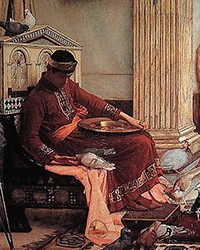Alaric became the leader of the Visigoths in the year 395. He was an ally of Rome, who aided it military conflicts with his determined, based on a cavalry army. He was aware of Roman habits and traditions and realized that only cooperation and an alliance with the emperor can guarantee his compatriots long-lasting peace and stability. He was also conscious of the problems which the Western Empire faced, and which above all included the invasions of warlike tribes, which constantly crossed the borders on the Danube and the Rhine. The demands Alaric directed towards Emperor Honorius were great but not unrealistic. Among them was the demand to change the status of Visigoth regiments from the position of foederati, to the position of a regular army under his leadership, as well as demands for gold and grain in exchange for the defense of Roman interests, but also territories on which his subjects could settle. It must be added that, filling high positions in the Roman army with the so-called barbarians was nothing new. Romans used their abilities playing the tribes against one another, while also engaging them in ad hoc struggles, which they constantly fought against them. That is why from the perspective of Alaric, the Visigoths died for Rome and while they were its allies, they felt used and humiliated, but most of all left to fend for themselves in face of the aggressive Huns. Since the conditions of the Visigoths were unacceptable to the Romans, but on the other hand they were fully aware of the military prowess of Alaric, they deceived and mislead him until the moment, when having had enough of Roman intrigues, but most of all of unpaid wages for one of his military escapades, this leader standing at the head of his 30-thousand army, decided to show Emperor Honorius exactly what he is capable of. He moved on Rome, looting towns found along the way, beginning the siege of the city in autumn of 408, cutting it off from food supplies. In exchange for 5 thousand pounds of gold, 30 thousand pounds of silver, thousands of silk tunics, thousands of leathers and… 3 thousand pounds of pepper the siege was lifted. Among the goods which were taken as part of the contribution there were also (according to the chronicler Zosimus), metal elements of pagan temples. Alaric hoped that this act would force the emperor to yield while his demands of land in Noricum (on the Ister River (Danube)), supplies of grain and regular pay for his army would be heard. The emperor was initially willing to negotiate, but ultimately when Alaric departed from the gates of Rome, he backed off. Further negotiations lasted the whole year and brought no result – Alaric feeling neglected and at the same time wanting respect from among his own ranks once again lay siege to the city as negotiations continued, until finally in 410 his loot-thirsty army entered Rome. It was not difficult, as the starving, lonely and tired by years of uncertainty Romans, did not put up much resistance and willingly opened the gates in order to diminish the predicted losses and appease the occupying forces. For three days the Visigoths plundered and looted the city. As a good Christian, although an Aryan (Arianism), Alaric spared churches and people who sought shelter within. He did not want to murder but rather to loot, therefore the city did not experience heavy losses in human life.
Some historians, for example Peter Brown, even claim, that this was one of the most civilized invasions in the history of the world. However, for the Romans themselves, who had for centuries lived, as they assumed, in an undefeated city, it was a real blow – both for the representatives of the traditional old cults (pagans), as well as for Christians. According to the former the blame for the devastation of the city lay with the Christians, who drove out their cults and destroyed temples of guardian deities. For the Christians, invasion by another Christian was unfathomable. Rome – urbs sacra, a city emanating with the sanctity of its two most important martyrs, Peter and Paul, which had just been set free from paganism (at least officially) was after all to be an oasis of safety and prosperity.
The sack of Rome, so heavily felt, was analyzed by several noteworthy Christian writers of that time, among others the later saint Augustine – the bishop of the African province of Hippo, which terrified Romans reached, telling him of the trials and tribulations experienced by their city. After some thought, Augustine stated, that Rome was only punished “as a servant, who knowing the will of his master and doing things worthy of punishment receives a great whipping”. On the other hand Saint Jerome, when news of the fate of Rome reached him was to have said: “Along with this city, the whole world has perished”.
Rome had no value in itself for the invaders. Stripped of valuables and food it was quickly abandoned. They went south with the intention of reaching Africa by way of Sicily. With them, as prisoner they took the sister of Emperor Honorius, Galla Placida, who was in Rome at the time. However, due to a storm, the idea of transporting armies through the Strait of Messina proved impossible. Therefore, Alaric had to change his plans and in search of a place for himself and his peoples directed his armies north, looting whatever he could along the way.
What happened to Alaric? We do not know. We can only assume, that he was either poisoned or died of the plague. His successor Ataulf, married the kidnapped sister of the emperor and settled with his warriors in Gaul, hoping that his wedding would change the attitude of Honorius towards him. Ultimately in 416 a truce between the Visigoths and the emperor of the Western Empire was reached. After the return of Galla Placida which was to guarantee supply of grain, the Visigoths became allies of the emperor in the struggle against the Vandals invading Gaul and finally the emperor let them settle in Aquitania and freed them of taxation and Roman jurisdiction.










